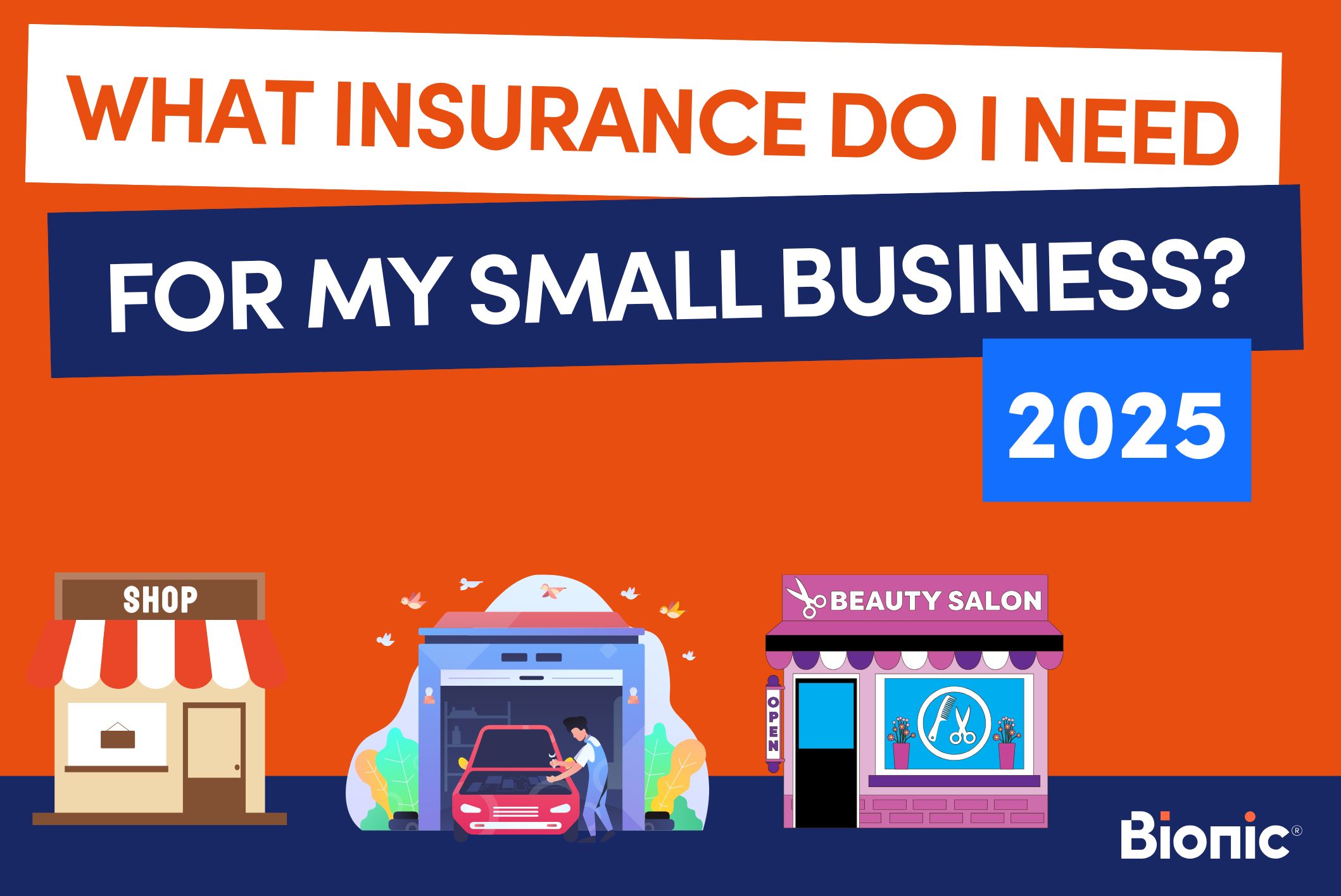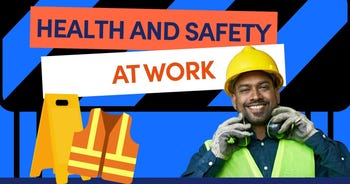What insurance do I need for my small business? 2025 Guidance
Did you know that 80% of UK small businesses could be underinsured? And that's not because business owners aren’t on top of it. It’s because it can be difficult to really understand what business insurance you need.
Every business is different, and so are the risks, whether you’re a shop owner, manufacturer, or anything in between.
This guide cuts through the generic advice and template solutions that leave you totally confused. We'll show you exactly how to identify your real risks, avoid the coverage gaps that could lead to rejected claims, and get protection in place that could help when you need it.

What business insurance do I legally need?
Let's start with the non-negotiable requirements, because getting this wrong could lead to a disaster for your business.
Employers' liability is legally required for employees
If you employ anyone - even one part-time worker - you must have employers' liability insurance. The moment you become an employer, this becomes law.
Here's what most guides won't tell you - the biggest trap is always thinking family members don't count. Although there are some exceptions, you should still consider having this in place. After all, a family member who gets injured on your watch could still claim against you.
Can I risk not having insurance?
The choice is yours – but it’s not the best idea to skip out on it. As it’s a legal requirement, there are some real financial consequences if you don’t:
- You could be fined £2,500 for every day you don't have employers’ liability
- You could be personally responsible to pay out if an employee makes a claim - this could potentially be thousands of pounds.
What other insurance is legally required?
If you use any delivery drivers or vans, commercial motor insurance is a legal requirement in the UK. This includes:
- Your personal car when visiting clients
- Company vehicles
- Employee vehicles used for work (even picking up supplies)
Remember - regular car or van insurance will not cover you or your employees if they’re driving a company vehicle. Commercial vehicle insurance covers vehicles used for business purposes, such as driving to and from properties if you’re an estate agent, for example.
Bionic is not able to cover your vehicle, but it’s likely we can help you insure your business operations.
Professional indemnity insurance for professionals
Although not a legal requirement, professional indemnity insurance can be purchased for businesses that provide professional advice or services.
In certain professions, such as law, accounting, and engineering, regulatory bodies or specific contracts may require PI to be taken out. For example:
- Solicitors who are SRA-regulated need to take out a minimum level of PII cover in accordance with the minimum terms and conditions. This is normally £2-3 million minimum.
- ICAEW accountants - £2 million minimum
Remember, your professional body requirements can change.
It’s always a good idea to keep up to date with the requirements of any regulatory bodies you belong to, so you avoid any gaps without sufficient cover. For example, the ICAEW increased the minimum coverage from £1.5 million to £2 million in September 2024; therefore, some professionals may have been underinsured if they were not aware of this change.
How do I know if I'm underinsured?
You may find you end up underinsured from one simple mistake. When getting a quote you might put the wrong your business description. If you fill in a generic form and get a quote based on a generic description, this may not reflect the actual risks that are specific to your business.
And this could lead to being underinsured and potential future claims getting rejected.
Learn more about common business insurance mistakes.
The business description trap
For example, you might describe yourself as an engineer, but you should declare what type of engineer...
- Engineer - could mean computer engineer or chemical engineer. Insurers would see these jobs as having completely different risk profiles.
- Retailer - doesn't distinguish between selling books or selling power tools
- Technology services - covers everything from website design to AI automation
To avoid this, be more specific about your actual activities. The more specific you are, the more accurate your coverage will be.
At Bionic, we don’t use generic forms. Our quotes process starts online and empowers you to get the right quotes specific for your business needs. And if you need support or get stuck, we can connect you straight to a UK-based member of our team to help guide you through the process.
Coverage gaps that could lead to rejected claims
Here are a few things to be aware of...
Policy conditions you didn't know about
Insurers will set out requirements in your policy they expect you to meet, if you don’t and need to make a claim, you might not be covered. Common conditions may include:
- Maintaining specific security measures (like health and safety regulations)
- Regular equipment maintenance
- Proper storage of materials (for example, locking your tools away securely at night)
- Proper employee training
This is why it’s so important read the small print in your policy and abide by any conditions set out by your insurer. If you don’t and attempt to make a claim – insurers are within their right to right to reject. They could simply say - you should have checked your policy.
Gradual damage exclusions
Many policies only cover sudden, accidental damage. If your business operations gradually damage someone's property (like vibrations from machinery), you might not be covered.
Cyber exclusions in traditional policies
If you don’t have cyber insurance in place – your existing policy may not provide cover you if you suffer a cyber-attack on your systems. You may need to take out a separate policy to help cover you from data breaches.
Real world example
Imagine you’ve been running a successful local bakery for 8 years and built up a loyal customer base. One morning, you notice your POS payment systems isn’t working properly. You look into the issue and find out your payment system has a security breach. Not only do you now need to notify customers and apologise, potentially damaging your reputation. You are liable for fines as well as legal fee costs if any customers try to take you to court.
The lesson here is to check the security measures your partners and suppliers have in place. Optional covers may provide help in these situations.
What cyber insurance do I actually need in 2025?
50% of businesses in the UK reported having some kind of cyberattack in 2024. Cyber attacks have become so widespread that every business — regardless of size — faces potential risk.
Why small businesses are prime targets
Although it’s often in the news, it’s not always the corporate giants who get targeted by cybercriminals. Small businesses are actually often targets, because:
- They have valuable data but can’t always afford tight security measures
- They're less likely to have incident response plans
- They may be inclined to pay ransoms quickly to get back to business
- They're connected to larger companies through supply chains, which could offer a way in for cybercriminals.
With these risks in mind, cyber insurance is available as an optional cover for businesses concerned about digital threats. Learn more about cyber insurance for your business.
Do I need professional indemnity if I'm not regulated?
Professional indemnity is not a legal requirement but, as mentioned, it’s sometimes a regulatory requirement for many professionals like solicitors, for example.
However, if you’re not part of a regulatory body – do you really need it? The truth is, it’s still worth considering - especially if you give out advice as part of your work.
If you’re a creative freelancer, business consultant or training provider dishing out advice it could impact large business decisions. And if your advice leads to financial loss – you could be held liable.
To make the right choice, you should think about your risk tolerance and how much you’re willing to spend on insurance to help protect your business.
The client contract reality
Depending on what industry you work in - some clients may not want to work with you if you don’t have some level of indemnity cover in place. They're not being difficult - they're just protecting themselves.
Even public service sectors may require proof before signing contracts. So without it, you may be missing out on business opportunities with new partners – it's something to really think about.
Why public liability isn't just for "risky" businesses
When it comes to construction – it’s pretty clear why public liability could be considered, as working in public areas can increase the chance of injury by the public.
But what about businesses that don’t seem as ‘risky’ ? The right public liability cover could still be essential for:
Shops
If you run a local shop or grocers, then you’ll have some loyal customers that step into your shop daily. This means you’re not risk-free either. Spilt or spoiled produce on the floor could cause customers to slip or fall – leading to injuries. Therefore Public liability insurance is a key consideration along with many other types of cover.
Read more about insurance for shops.
Takeaways
Similarly to shops, if you’re takeaway is bustling on a Friday night, then there is the risk of greasy floors which can cause slips and trips. Having PL in place along with others, could help protect you if an injured customer decides to claim.
Learn more about takeaway insurance.
Wholesalers
As a wholesaler – you may have partners or clients come to your warehouse to see your operations. If stock or packaging is left lying around – it could increase the risk of slips and falls – leading to injury.
Even if you’re supplying flowers, bikes or anything in between – You can consider public liability in your insurance package. Read up on wholesale insurance to see answer any more of your questions.
Offices
If you have clients or suppliers that visit your office premises, there is a chance they could slip, trip, or fall and injured themselves. And you could be held liable, even if your office seems “safe” and you follow proper health and safety regulations.
Learn more about office insurance.
Salons
Designed for hairdressers and beauty salons, salon insurance includes public liability cover. This includes protection against injury claims or if one of your clients suffers an allergic reaction caused by one of your treatments.
Find out more about salon insurance.
Cafes
Cafe insurance sometimes has added requirements for food hygiene and safety standards. Check your policy to see if this applies to you. You could also be held responsible if a customer burns themselves on a hot plate or an employee spills coffee on a customer's expensive coat. Cafe insurance can help cover your business for the cost of claims made against you.
Find out more about cafe insurance.
Hotels
Hotels should consider public liability insurance. It can help protect your business against claims from guests, such as slips and falls and natural disasters. For example, if a guest slips on a wet floor in your hallway and files a claim, hotel insurance could help cover the legal costs and compensation.
Online businesses
You might think you're risk-free if you don’t have a physical office space – but that’s not necessarily true. You could run into the following:
- A delivery to a customer's address causes property damage
- You attend industry events and accidentally damage venue property
In these cases, many businesses choose to have a level of public liability in place. Learn more about insurance for online businesses.
Home-based businesses
If you run your business from home, then you should still consider business cover – especially if you have clients in your home. For example, if you are a self-employed counsellor.
Standard home insurance won't cover business-related claims. If a client slips and falls down your front doorsteps they may have grounds for a claim. So, to prepare and protect yourself, you can consider getting home-based business insurance.
Remember, you should always tell your home insurer if you are running a business from home, even if it’s a part time business.
How to avoid the insurance trap
Cheap insurance doesn’t always pay. What does that mean?
Some brokers may supply you with the cheapest quote possible. Especially if you’re filling in a generic form. This may look great on paper, but when you look into the details – what are you actually getting for it?
Ollie Barrett – Senior Technical Insurance Manager at Bionic, states - “Not all sectors have the same types of risks. Your cover should meet your individual business requirements, making sure sums insured are adequate to cover your business in the event of a claim.
You should always check your insurance policy to ensure that you are happy with the terms and conditions that have been applied. Policies may have higher excess for specific sections of your policy, or restrictions in cover, or both! Look through your policy documentation to check any excess, terms and conditions that may apply.”
What insurance actually costs
- High excesses - A cheap policy might mean you have a really high excess. For example, that £200 annual policy might have an excess of £5,000. For many small claims, you might have to pay everything yourself.
- Limited coverage - Cheap policies may exclude key risks or have low sub-limits that don't provide the protection you need
- Poor claims service - When you need to claim, very cheap insurers may provide minimal support to help you through the process.
Things to consider before opting for an insurance quote
- Is it significantly cheaper than other quotes? (could indicate limited cover)
- Does it have very generic policy wording without industry-specific provisions?
- Does it mention of any claims support services
- Did you fill out a quick generic form without speaking to a real person?
What to look for in your insurance quote
Instead of going with the cheapest premium, you should look for:
- Appropriate cover limits for the risks your business faces
- Industry-specific policy wordings
- 24/7 claims support
- Risk management services
- A human broker you can speak to check the specifics
When to use professional help
Some insurance decisions are too important to get wrong – and there are plenty of honest insurance brokers out there who can help.
You can use a broker when...
- You’re not sure what options you have
- Your business has complex needs or unusual risks
- You need specific cover for your industry
- You've had claims rejected in the past
- You're unsure about your gaps in cover
Sorting the right business insurance
Remember, it’s not about buying the most insurance or the cheapest insurance – it's about finding the right protection for your specific risks at a price that makes business sense.
When you have the right cover in place, you can focus on growing your business instead of worrying about what might go wrong. At Bionic we help insure small to medium businesses from shops and salons to takeaways and sole traders. Start a quote online to get started to compare business insurance and a member of our insurance team will be on hand to help you through the specifics. Don’t want to chat now? You can schedule a call when it suits you best.








